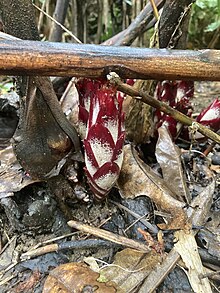Hornstedtia scottiana
| Hornstedtia scottiana | |
|---|---|

| |
| Scientific classification | |
| Kingdom: | Plantae |
| Clade: | Tracheophytes |
| Clade: | Angiosperms |
| Clade: | Monocots |
| Clade: | Commelinids |
| Order: | Zingiberales |
| Family: | Zingiberaceae |
| Genus: | Hornstedtia |
| Species: | H. scottiana |
| Binomial name | |
| Hornstedtia scottiana | |
Hornstedtia scottiana, common known as Scott's ginger, jiddo, or native cardamom, is a very large ginger (member of the family Zingiberaceae) native to Queensland, New Guinea and the Maluku Islands. Its fruits are eaten by the cassowary. It is also a food plant for the larval stages of the Banded Demon Butterfly. [3]
Taxonomy
It was first described in 1874 by Ferdinand von Mueller as Elettaria scottiana from a specimen found in the rainforest in Rockingham's Bay by John Dallachy.[1][4] In 1904, it was redescribed as belonging to the genus, Hornstedtia, by Karl Moritz Schumann.[1][2]
See also
References
- ^ a b c "Hornstedtia scottiana". Australian Plant Name Index, IBIS database. Centre for Plant Biodiversity Research, Australian Government. Retrieved 30 December 2018.
- ^ a b Schumann, K.M. (1904) in Engler, H.G.A. Das Pflanzenreich 20: 194.
- ^ F.A.Zich; B.P.M.Hyland; T.Whiffen; R.A.Kerrigan (2020). "Hornstedtia scottiana". Australian Tropical Rainforest Plants Edition 8 (RFK8). Centre for Australian National Biodiversity Research (CANBR), Australian Government. Retrieved 20 June 2021.
- ^ Mueller, F.J.H. von (1874) Fragmenta Phytographiae Australiae 8(65): 24.
